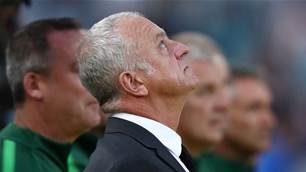Ever found yourself saying you could do better than your team’s coach? FourFourTwo publisher Andy Jackson did... then decided to do something about it by taking the FFA’s C Certificate coaching course.
As a final note of housekeeping Alistair also informs us that as soon as we are in receipt of our official kit, it is to be our uniform for all sessions and meals, which immediately renders useless the 14 changes of clothes my ever- attentive fiancée had made me re-configure my car to accommodate. Given this accounts for around 12 hours of every day, my first thought is that one pair of tracksuit pants is surely a misprint on the kit list but decide to say nothing.
The core focus of the C Certificate is to concentrate on the development of elite junior players, ensuring they are equipped with the technique (that word again) and skill to execute it in a game.
The first thing that strikes me is that there is a huge difference between putting on drills and actually coaching.
I look back to my own playing days and quickly realise I've never been coached properly in my life and immediately wonder how much better a player I could have been if I had. The course focuses predominantly on basic technique development and the progression of that technique into smaller versions of the game up to seven vs seven. We learn to appreciate that all elements of the full-sized game can be effectively coached in a four vs four situation and against this backdrop the value of the introduction of Small Sided Games at junior levels becomes even more apparent.
The two phrases that will serve as a lifelong legacy of this course for me are "width and depth" and "level and outside" the former referring to the shape best adopted to maintain possession and provide a platform for forward penetration and the latter referring to the optimum position to receive the ball in relation to your nearest defender. These are the ever-present mantras in everything we do and form the building blocks for all our practical on-field work.
The week leading up to our first practical assessment makes me realise that far from being a handicap, my lack of coaching experience may well be a blessing in disguise. I see many people wrestling with what they are being shown and how it may conflict with what they have previously been taught. I'm not sure anyone disagrees with what we're learning it's just that change doesn't always sit naturally and with the looming practical assessments, some people are faced with having to coach in a way they haven't had to before.
For many on this course acquiring this qualification is critical to their career, none more so than Deans, who would find himself suspended from his position as youth team coach of Newcastle Jets if he didn't pass. The pressure is on for many and there's a realisation that this is a serious business.
It seems like we've only just got our bearings when we're given our first practical assessment topics to sharpen our focus. I'm given the challenge of improving player's ability to shoot with power. In 15 minutes we have to move through three progressions from an introduction exercise looking at the technique in isolation through a developmental phase involving increasing the pressure on the performance of that technique before ending, in most cases, in a game situation to show the application of that technique in a realistic environment.
Our sessions have to be mapped out in advance but the good news is we have two days to work on these in between our timetabled program. I find this way too long and find myself tinkering with mine. The instructors make themselves available for guidance and I spend a little time with Harry Bingham running through my session and everything seems in order.
By the time it's my turn, I've watched around eight of the group complete their assessments with varying degrees of success, but of course, it all looks so easy from the sidelines. Next it's my turn and I'm surprised at just how nervous I am with all the things to remember running through my head: "Get your coaching points out, progress the session at the right time, spot faults step in and correct and then get out again and let them play".
The allotted 15 minutes flies by and I soon have time to reflect on where I went wrong. The obvious mistake I made was simply not taking the time to get the balls in the goals at each end of the pitch for my finishing exercise of five vs five, therefore wasting a lot of time. Clearly I will have lost marks for this but the other pointer I get from Alistair in the short debrief was that while I jumped in at the right moment and correctly diagnosed the faults, I didn't then allow the player to show if he'd taken on board my coaching points.
In the aftermath of the first assessment, it's clear some people face a major wake-up call. Some appear keen to take feedback on board and others resort to a form of denial where they convince themselves the assessments don't actually represent a true test of coaching ability. This struck me as a waste of energy because just like you can argue whether the driving test is a true test of real world driving ability, whether you like it or not you have to pass that test to get your driving licence and in essence this course is no different. This presented a real challenge for quite a few people on the course and one that took some people a few days to get their heads around.
Continued on next page...
Related Articles

Backlash over Fox Sports new season launch

W-League, A-League set for world-first equal marketing split












